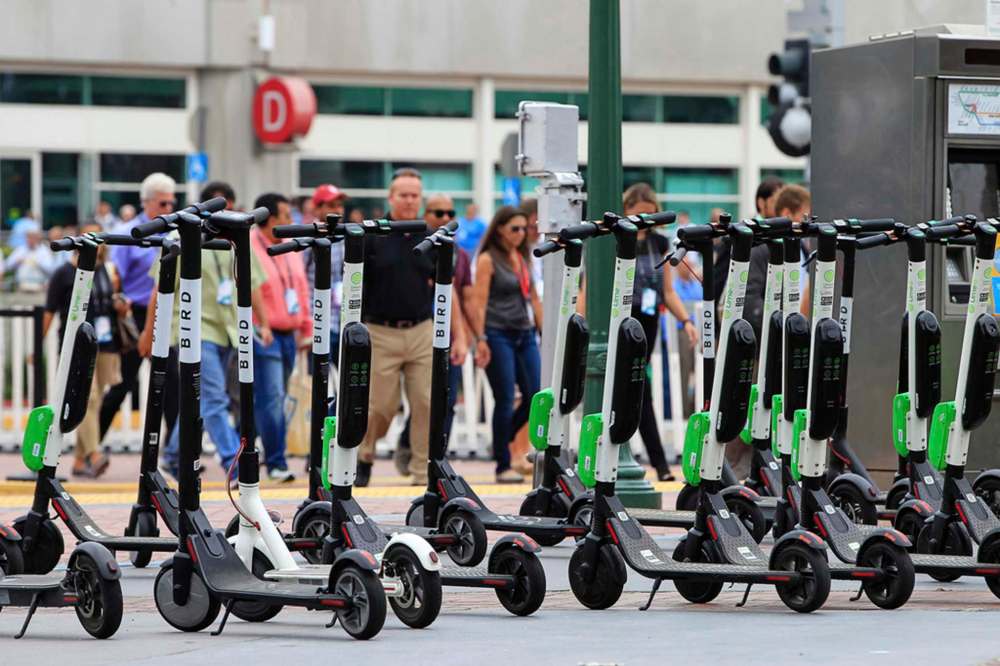City testing of e-scooters up to province
Advertisement
Read this article for free:
or
Already have an account? Log in here »
To continue reading, please subscribe:
Monthly Digital Subscription
$0 for the first 4 weeks*
- Enjoy unlimited reading on winnipegfreepress.com
- Read the E-Edition, our digital replica newspaper
- Access News Break, our award-winning app
- Play interactive puzzles
*No charge for 4 weeks then price increases to the regular rate of $19.00 plus GST every four weeks. Offer available to new and qualified returning subscribers only. Cancel any time.
Monthly Digital Subscription
$4.75/week*
- Enjoy unlimited reading on winnipegfreepress.com
- Read the E-Edition, our digital replica newspaper
- Access News Break, our award-winning app
- Play interactive puzzles
*Billed as $19 plus GST every four weeks. Cancel any time.
To continue reading, please subscribe:
Add Free Press access to your Brandon Sun subscription for only an additional
$1 for the first 4 weeks*
*Your next subscription payment will increase by $1.00 and you will be charged $16.99 plus GST for four weeks. After four weeks, your payment will increase to $23.99 plus GST every four weeks.
Read unlimited articles for free today:
or
Already have an account? Log in here »
Hey there, time traveller!
This article was published 01/07/2020 (1989 days ago), so information in it may no longer be current.
A trial project deploying electric scooters throughout Winnipeg will require a green light from the province before any of the e-powered two-wheelers hit city streets.
An administrative report on the standing policy committee on infrastructure renewal and public works meeting agenda Tuesday recommends the city ask the provincial government to approve a trial for e-scooters to operate on the city’s transportation network.
The request is the first step toward opening the door to dockless scooter and “micromobility” operators, such as Bird Rides Inc. and Lime, in Winnipeg. Currently, provincial legislation prohibits electric scooters from using public right-of-ways in Manitoba.

Dockless e-scooters and e-bikes have gained some popularity with urbanites throughout Canada for ease of access and ubiquitous availability. Electric scooters can be deployed — on boulevards, in parks and plazas — and rented through a smartphone application.
Users can find a nearby scooter on the app, unlock and rent the vehicle with their phone, and then zoom to their destination, where they leave the scooter for the next user.
“I’m pleased to see the public service has an open mind about asking the province of Manitoba to change the law concerning scooters,” said Coun. Matt Allard, chairman of the infrastructure renewal and public works committee.
“I believe this technology could play a key role in our active transportation environment here in Winnipeg, giving people more options to get around outside of their cars.”
A spokesman for the provincial government said Tuesday in an email statement e-scooters do not meet the definition of a motor vehicle or a bicycle under the Highway Traffic Act.
“There is no means under the existing legislation to pilot test e-scooters and other new vehicle technologies,” the spokesman said.
In March, the province introduced the Vehicle Technology Testing Act, which established a framework for testing autonomous vehicles and new vehicle technologies, he added. “Once the bill is passed and a regulatory framework is in place, consideration can be given to safely testing e-scooters and other vehicle technologies that do not currently conform with the (Highway Traffic Act).”
City officials hoped to work with third-party micromobility operators to establish a short-term rental network for bikes and e-bikes, in addition to scooters, throughout Winnipeg, but following an expression of interest learned most major players only offer e-scooters.
“It appears that, if the city is interested in the provision of micromobility options, the public service may have to take an active role as a stakeholder in the operation of this program,” the administrative report states. “The cost of such a program could be quite significant, but there appear to be merits to offering such a program as a city service.”
The public service has asked for permission from council to develop a business case for a city-led program.
“With the dramatic drop in Transit ridership due to COVID-19 and its uncertain future, we need to continue to develop other alternative transportation options for Winnipeggers who get around without a vehicle,” Allard said. “This could fit into this picture.”
If passed by the standing policy committee, the report would move on to executive policy committee and council for consideration.
danielle.dasilva@freepress.mb.ca

Our newsroom depends on a growing audience of readers to power our journalism. If you are not a paid reader, please consider becoming a subscriber.
Our newsroom depends on its audience of readers to power our journalism. Thank you for your support.
History
Updated on Wednesday, July 1, 2020 7:15 PM CDT: Fixes typo in photo caption.


